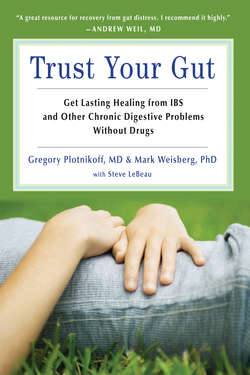Читать книгу Trust Your Gut - Gregory Plotnikoff - Страница 20
На сайте Литреса книга снята с продажи.
The Ancient Wisdom of the Gut as Center
ОглавлениеOur everyday language uses phrases that depict the gut as a source of power, emotions, and intuitive intelligence. We say a person with a strong will has a lot of guts. A brave person performs gutsy actions. We praise one's intestinal fortitude. But those who show great fear and run away at the sight of danger are gutless cowards or yellow bellied. Even a slight fear such as stage fright before a performance can give you butterflies in your stomach. And when we know something through an intuitive hunch, we attribute it to our gut feelings or our gut instinct.
When you exercise or play sports, you can feel that your gut is your center of gravity. Balance is everything when you perform well. In traditional Asian medicine, the gut is the center of the body in another way: it is the source of your life energy. That center also requires a balance, because it is when our energies become imbalanced that we become ill. The gut is our battery, and we must live a lifestyle that keeps it well charged with energy. Because everything in your body/mind system depends on this energy, a lack of chi can affect your mood as well as your performance. In Japan's kampo tradition of medicine, the diagnosis of all illnesses begins with examining the gut.
If you've ever done yoga, Tai Chi, or any of the martial arts, you know what it is to feel that energy course through your body. It has different names—prana in Sanskrit, chi in Chinese, and ki in Japanese—but it all means the same thing: the vital, life-giving, and life-sustaining force necessary for health. This flow of energy from the center is the basis for success in the martial arts, Zen meditation, flower arranging, Zen archery, and every other mindful activity. Centered practitioners perform in a relaxed and effortless manner with calm and focused minds. Like the best actors and dancers, they make it look easy and natural.
Asia wasn't the only place where the gut was seen as a major center of vitality and emotion. Some translations of the Bible also depict the guts as the seat of strong emotions such as compassion, mercy, intuition, and empathy. For example, in the story about the wisdom of King Solomon, in which he proposes cutting a baby in half to solve an argument between two women who both claim a child, the Cambridge edition of the King James version says “her bowels yearned upon her son” (I Kings 3:26). In our effort to restore your faith in your gut, we are harking back to the wisdom of the ages.
| CENTERED | UNCENTERED |
| Relaxed | Anxious |
| Effortless | Struggle |
| Focused | Scattered |
| Functional | Dysfunctional |
| Aware | Confused |
| In control | Out of control |
